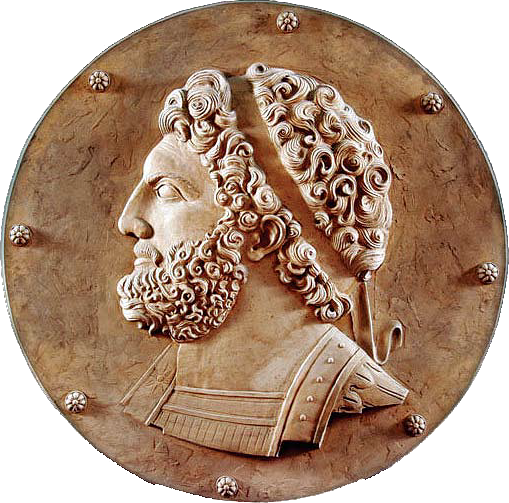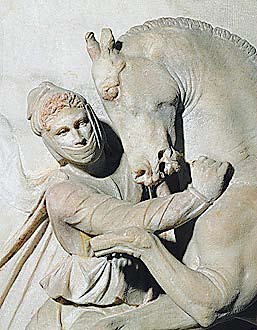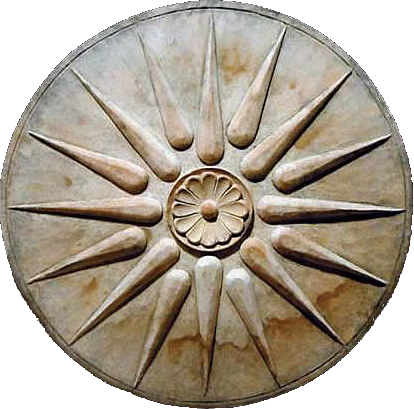Alexander the Great was born in 22nd July 356 B.C. at Pella. His parents were King Philip ll from Macedonia and his mother Olympia. The legend says that Alexander’s father and mother met in Samothraki, at the well known sacrement of Kaveira.
The period which Alexander was born, as it occured frequently in the Greek ancient world, was a time of intense political and war confliction. As Isocratis wrote “Greece is covered and occupied from war, revolution, slaughter and numerous hardships”.
The Macedonian Kingdom was obligated to function mainly in a military way, so to resist its numerous invasions and be able to survive. The army was excellently organised and therefore a distinguished organised Kingdom, ruled by the king and administration, the council and assembly.
A kingdom with great political power and even greater military power, which not only became greater continually but also had the strength to produce new weapons and new forms of war confliction.
The javelin became known during Philip’s time, in 359, the character and the excellent spear was Macadonian. Its length was from 5,32 up to 7,10 metres long. The soldiers in the 1st rank held the shorter spears, but the laters held the longer ones. The function of this special weapon needed skills and excellent physical condition.
From the beginning of his kingdom Philip, a year before the birth of Alexander, confronted the external threats with strategic and diplomatic persuasion and succeeded in winning military and political victories. His victories against Illirion of Paionon and more were connected with the allies of Molossous, from the tribe where he married Olympias, 357, even though more alliances were created.
Philip’s strong characters continued his political attack from the first years of his kingdom. With his method of pressure, he drove all the cities under his command. Whenever this was not established he used military power.

Philip ll, king of Macedonia
Philip’s expedition against Thrace had aim of two important cities: Perintho (Irakleia) and Byzance (then Constantinopolis). Philip assigned deputy of Macedonia, Alexander, which was then 16 years old. During the time of his father’s abscence he stopped the rebellion at Maidon, re-established the capital as “Alexandroupoli” whilst the Greek city Krinides, followed his father’s politics, created a colony, which he empowered and named Philipos.
With his victory at Heroneia, Biotias, 338, Philip completed his seize on the Greek mainland and appointed Macedonia the only strength of Greece. Alexander contributed towards the attack against Thiva and leaded the attack against well-known Iero Loxou. In Athens he was honoured as a guard which transported the ashes of the soldier and prisoners.
In 337 Philip created “the community of the Greeks” and legalised a common council. “The public”, with political and military centre, Macedonian, and the cultural centre, was Athens, and it consisted of two powerful connective confederations, that had the strength to inflict their views with political and diplomatic way and whenever it was needed with military power of 15.000 horsemen, 200.000 soldiers and 160 tritheist crew of 30.000 men.
From “The public” laws were set to the “common council” where the members presented one or more cities, depending on the military and naval power. The council was the main power, decisions were sent to cities to be legalized, but the judical and economical strength was great, such as discipline which was forced on each city that fleed restrictions.
In the same year “The public” declared war to the Persians and Philip was the leader.

Alexander and Voukefalas
In the meanwhile a revolution would start as never before. The hazzards were many, Philip was already injured 7 times, but knew that he had his son Alexander with him, who had shown excellent skills in war and peace. During the time of peace horse riding with Voukefalas characterised the value of the heir to the Macedonian thrown.
Voukefalas untamed and a wild horse, did not listen to anyone. Alexander said “What horse are they losing! They can not tame it, because they have no understanding and courage”. Alexander noticed that the horse’s shadow caused the problems, he pushed his head towards the sun and started riding the horse toward everyone’s surprise.
Then Philip shouted loudly “My son, ask for a kingdom that is worthy of you. Macedonia is too small for you”.
His father’s wedding with Cleopatra (337) caused clash not only with Philip and Olypiada, but between Philip and Alexander. The restoration and reconcilation of their relationship came before the expedition against the Persians. The advance guards with Parmeniona, Attalo and Aminta of the Macedonians had success in every internal battle, especially with the king and his successor, could cause great obstacles.
In 336 Philip was getting prepared for a new expedition with celebrations. In October the capital of Aiges (today’s Vergina)the showing of his strength and wealth from Philip had great meaning. When the parade finished, Philip stood in the middle of the theatre, where he was cheered on like a god from the crowd. The parade was of great wealth.

The sixteen-pointed Sun of Vergina, Emblem of the Macedonians
Hamond wrote in his book “Alexander the Great. A genius” :
“In front of the parade were rich decorated statues of the 12 Gods of Olympus and a grand statue of Philip, “equal to gods as the king paraded with the 12 Gods”. Kings of Macedonia were regarded to have come from Zeus, the most distinct ones, were adored after death as gods and later “godly honoured” were summoned as kings of Macedonia. The best explanation for the statue was that it was granted “godly honour” and he himself could choose to show this grant.
When the parade finished, some associates of Philip with the leader Alexander, king of Molosson walked in the alley and took their seats in the first row. Then the associates were placed on the ends of the orchestra. Philip came in alone, wearing white clothing and was placed in the middle of the orchestra and accepted the crowds cheering. The seven bodyguards that came in after him were at a distance. Suddenly one of them, Pafsanias ran and slaughter the king and fled to the alley. Another three Leonnatos, Perdikas and Attalos, ran behind Pafsania who tripped over.”
Philip’s bodyguards killed the king’s murderer a few metres further away. The associates gathered around Alexander and Alexander Lingistis, son of Aeropou, was the first to acknowledge as hier to the thrown shouting “Alexander, son of Philip”. Alexander was elected king, head of his kingdom and buried his father with honour.


